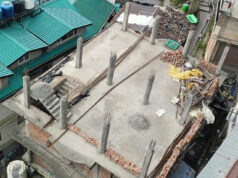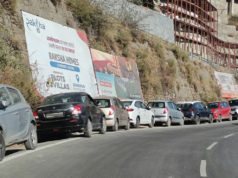In a striking example of long-standing negligence and bureaucratic delays, the Municipal Corporation Commissioner Court has finally ordered the demolition of the illegal construction at the Sanjauli Mosque, a full 14 years after the issue first surfaced. The question now looms: How could a five-storey structure be illegally constructed and left standing for over a decade under the watch of MC Shimla?
The case, which began in 2010, saw the Municipal Corporation issue a total of 38 notices to halt the illegal construction. Out of these, 27 were directed to a man named Salim, while 11 were sent to the Waqf Board. Yet despite these warnings and repeated reminders, illegal construction not only continued but expanded. By 2018, a five-storey mosque stood on the site, all without the necessary approvals. Where was the Municipal Corporation’s enforcement during this time?
Salim, who regularly attended hearings until 2016, abruptly stopped appearing, leading the court to declare him ex-party on June 15, 2016. Even then, no meaningful action was taken. This failure to enforce the law raises serious concerns about the inefficacy of the Municipal Corporation in handling such cases. Why were there no on-ground actions to stop the construction, despite 45 hearings before the final verdict?
The court’s latest and 46th hearing, presided over by Municipal Commissioner Bhupendra Atri, finally delivered a demolition order. Yet this decision only came after years of delays, postponements, and ineffective governance. Commissioner Atri himself oversaw four hearings over the past year before delivering the final decision. This begs the question: Could the case have been resolved sooner had it been handled more diligently?
It’s worth noting that this illegal construction case only accelerated after residents took to the streets in protest, demanding action from the authorities. Their outrage over years of inaction finally prompted the case to move forward, forcing MC Shimla to respond.
Adding another layer to this debacle is the ongoing dispute over the land. The Resident Welfare Society has claimed that the land where the mosque stands is actually government property and does not belong to the Waqf Board. They argued that the land in question, recorded as Khasra number 66, has no mosque registered on it and that the Waqf Board already possesses 156 bighas of land elsewhere in Sanjauli. On the other hand, the Waqf Board’s advocate insisted that the land belongs to the Board, citing their own revenue records. However, the Commissioner clarified that the court’s focus was strictly on illegal construction and would not address disputes over land ownership or activities occurring within the mosque.
The negligence of MC Shimla becomes even more glaring when one considers that construction on the mosque continued unchecked for eight years, despite multiple notices. The municipal body’s failure to halt the construction earlier reflects poorly on its ability to enforce regulations. Why was there no consistent follow-up from 2010 to 2018, when the mosque grew from a two-storey to a five-storey structure? How could such blatant disregard for the law go unnoticed?
This case exposes a troubling pattern of inaction, where serious issues are brushed aside or endlessly delayed. As illegal construction continues to plague the city, this case serves as a harsh reminder of the need for stricter enforcement, greater accountability, and faster legal proceedings within the Municipal Corporation. The demolition order, while welcome, comes far too late—years after the damage has already been done.
The question remains: How many more such cases of illegal construction are being allowed to continue under the watchful eyes of MC Shimla? And will this demolition finally change how the municipal body operates, or is this just another case of justice delayed, if not denied?












